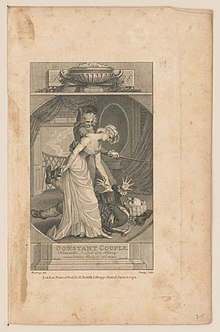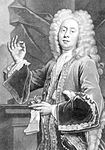
George Farquhar was an Irish dramatist. He is noted for his contributions to late Restoration comedy, particularly for his plays The Constant Couple (1699), The Recruiting Officer (1706) and The Beaux' Stratagem (1707).

Margaret Woffington, known professionally as Peg Woffington, was an Irish actress and socialite of the Georgian era. Peg and Peggy were a common pet name for those called Margaret until the late 20th century.
Susanna Verbruggen, aka Susanna Mountfort, was an English actress working in London.

Robert Wilks was a British actor and theatrical manager who was one of the leading managers of Theatre Royal, Drury Lane in its heyday of the 1710s. He was, with Colley Cibber and Thomas Doggett, one of the "triumvirate" of actor-managers that was denounced by Alexander Pope and caricatured by William Hogarth as leaders of the decline in theatrical standards and degradation of the stage's literary tradition.

The Recruiting Officer is a 1706 play by the Irish writer George Farquhar, which follows the social and sexual exploits of two officers, the womanising Plume and the cowardly Brazen, in the town of Shrewsbury to recruit soldiers. The characters of the play are generally stock, in keeping with the genre of Restoration comedy.

James William Dodd (1740?–1796) was an English actor, one of David Garrick's picked company.

William Pinkethman(also Penkethman, Pinkeman, Pinkerman, etc.; nicknamed Pinkey) (c.1660–1725) was an English comic actor, a low comedian with a droll style, and theatre manager. He was considered an imitator of Anthony Leigh.

Thomas Ryder (1735–1790) was a British actor and theatre manager, associated with the Smock Alley Theatre in Dublin. As a player, he was considered at his best in low comedy.

Mrs Goodall or Charlotte Goodall or Charlotte Stanton was a British actress known for her comedy roles at Drury Lane. She married Thomas Goodall and they were involved in a noted legal case.
Sir Harry Wildair is a 1701 comic play by the Irish writer George Farquhar. It is a sequel to the 1699 hit The Constant Couple, portraying the further adventures of the most popular character from the earlier play.
The Platonick Lady is a 1706 comedy play by the British writer Susanna Centlivre. Staged at the Queen's Theatre in the Haymarket in November 1706, it was published the following year and is sometimes dated as 1707. In the play's prologue the author defended the right of woman to write plays. The plot revolves around the question of platonic friendship.
The Fair Example, or the Modish Citizen is a 1703 comedy play by the English writer Richard Estcourt, originally staged at the Drury Lane Theatre. It was part of a growing trend of plays to feature a plot of an honest wife reforming her rakish husband along with Sir Harry Wildair, As You Find It, The Wife's Relief and The Modish Couple. It is a reworking of the 1693 French play Les Bourgeoises à la Mode by Florent Carton Dancourt. In 1705 a separate English adaptation of the French work John Vanbrugh's The Confederacy appeared at the rival Queen's Theatre in the Haymarket.
Love's Contrivance is a 1703 comedy play by the English writer Susanna Centlivre. The cast featured Robert Wilks as Bellmie, Anne Oldfield as Belliza, William Bullock as Selfwill, Benjamin Johnson as Sir Toby Doubtful and Jane Rogers as Lucinda.
John Mills (c.1670–1736) was a British stage actor. A long-standing part of the Drury Lane company from 1695 until his death, he appeared in both comedies and tragedies. His wife Margaret Mills was an actress, and his son William Mills also became an actor at Drury Lane.
Henry Giffard (1694–1772) was a British stage actor and theatre manager.
The Fine Lady's Airs is a 1708 comedy play by the British writer Thomas Baker.
Jane Rogers was an English stage actress. To distinguish her from her daughter she is sometimes referred to as Jane Rogers the Elder.

The Double Gallant is a 1707 comedy play by the British writer Colley Cibber.

The Fortune Hunters; Or, Two Fools Well Met is 1689 comedy play by James Carlile. It was originally staged by the United Company at the Theatre Royal, Drury Lane in London.
The Lying Lover; Or, The Lady's Friendship is a 1703 comedy play by the Irish writer Richard Steele. It was his second play, written while he was an army office doing garrison duty in Harwich during the War of the Spanish Succession. It is described as being both a restoration comedy and a sentimental comedy, and marked the transition between the two.











